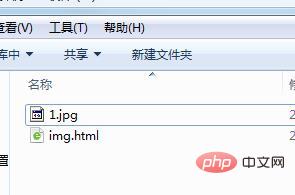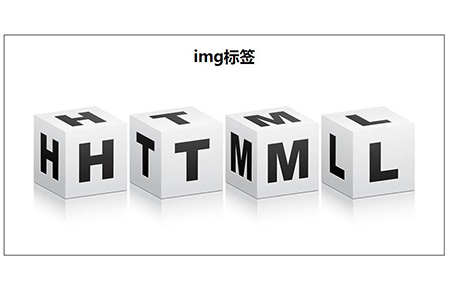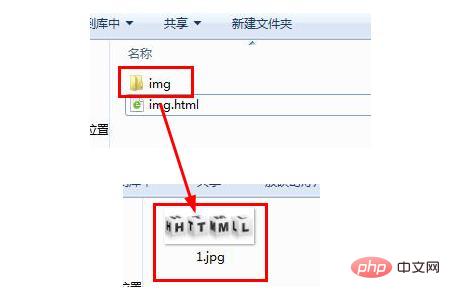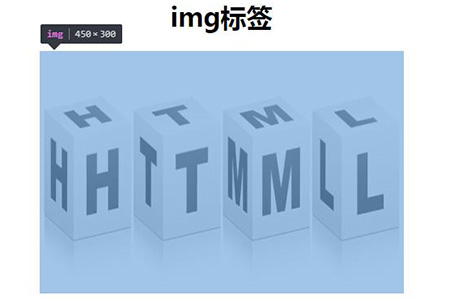How to use the img tag of html
Use of img tag: Display the obtained image through the src attribute of the img tag. The height and width attributes of the img tag set the size of the image. When the image cannot be displayed, use the alt attribute to display alternative text. The img tag of

html can be used to display images on a web page. It is an empty tag containing only attributes and no closing tag >.
Attributes of the img tag
The img tag can contain: src attribute, height and width attributes, and alt attribute. The src attribute and alt attribute are important attributes of the HTML img tag.
Let’s take a closer look at these attributes of the img tag:
1. src attribute
The src attribute is the description Required attribute of the image source or path, which instructs the browser where to find the image on the server.
So get the image? There are two situations:
1), Get the image in the same folder
When the HTML file and the image are in the same folder, like this:

We can directly fill in the image name in the src attribute, such as:
<div class="demo"> <h1 id="img标签">img标签</h1> <img src="/static/imghw/default1.png" data-src="https://img.php.cn/upload/article/000/000/024/5c14ce0fc6570638.jpg" class="lazy" / alt="How to use the img tag of html" > </div>
Rendering:


<div class="demo"> <h1 id="img标签">img标签</h1> <img src="/static/imghw/default1.png" data-src="https://img.php.cn/upload/article/000/000/024/5c14d1bf3d0d7788.jpg" class="lazy" / alt="How to use the img tag of html" > </div>
< img >
2. Height and width attributes
The height and width attributes of the img tag can be used to set the height and width of the image, for example:<img src="/static/imghw/default1.png" data-src="https://img.php.cn/upload/article/000/000/024/5c14d1bf3d0d7788.jpg" class="lazy" style="max-width:90%" height="300px"/ alt="How to use the img tag of html" >

img{
width:450px;
height:300px;
} 3. alt attribute
<h1 id="img标签">img标签</h1> <img src="img/How to use the img tag of html" style="max-width:90%" height="300px"/ alt="How to use the img tag of html" >

The above is the detailed content of How to use the img tag of html. For more information, please follow other related articles on the PHP Chinese website!

Hot AI Tools

Undresser.AI Undress
AI-powered app for creating realistic nude photos

AI Clothes Remover
Online AI tool for removing clothes from photos.

Undress AI Tool
Undress images for free

Clothoff.io
AI clothes remover

AI Hentai Generator
Generate AI Hentai for free.

Hot Article

Hot Tools

Notepad++7.3.1
Easy-to-use and free code editor

SublimeText3 Chinese version
Chinese version, very easy to use

Zend Studio 13.0.1
Powerful PHP integrated development environment

Dreamweaver CS6
Visual web development tools

SublimeText3 Mac version
God-level code editing software (SublimeText3)

Hot Topics
 1386
1386
 52
52
 Table Border in HTML
Sep 04, 2024 pm 04:49 PM
Table Border in HTML
Sep 04, 2024 pm 04:49 PM
Guide to Table Border in HTML. Here we discuss multiple ways for defining table-border with examples of the Table Border in HTML.
 HTML margin-left
Sep 04, 2024 pm 04:48 PM
HTML margin-left
Sep 04, 2024 pm 04:48 PM
Guide to HTML margin-left. Here we discuss a brief overview on HTML margin-left and its Examples along with its Code Implementation.
 Nested Table in HTML
Sep 04, 2024 pm 04:49 PM
Nested Table in HTML
Sep 04, 2024 pm 04:49 PM
This is a guide to Nested Table in HTML. Here we discuss how to create a table within the table along with the respective examples.
 HTML Table Layout
Sep 04, 2024 pm 04:54 PM
HTML Table Layout
Sep 04, 2024 pm 04:54 PM
Guide to HTML Table Layout. Here we discuss the Values of HTML Table Layout along with the examples and outputs n detail.
 HTML Input Placeholder
Sep 04, 2024 pm 04:54 PM
HTML Input Placeholder
Sep 04, 2024 pm 04:54 PM
Guide to HTML Input Placeholder. Here we discuss the Examples of HTML Input Placeholder along with the codes and outputs.
 HTML Ordered List
Sep 04, 2024 pm 04:43 PM
HTML Ordered List
Sep 04, 2024 pm 04:43 PM
Guide to the HTML Ordered List. Here we also discuss introduction of HTML Ordered list and types along with their example respectively
 Moving Text in HTML
Sep 04, 2024 pm 04:45 PM
Moving Text in HTML
Sep 04, 2024 pm 04:45 PM
Guide to Moving Text in HTML. Here we discuss an introduction, how marquee tag work with syntax and examples to implement.
 HTML onclick Button
Sep 04, 2024 pm 04:49 PM
HTML onclick Button
Sep 04, 2024 pm 04:49 PM
Guide to HTML onclick Button. Here we discuss their introduction, working, examples and onclick Event in various events respectively.




